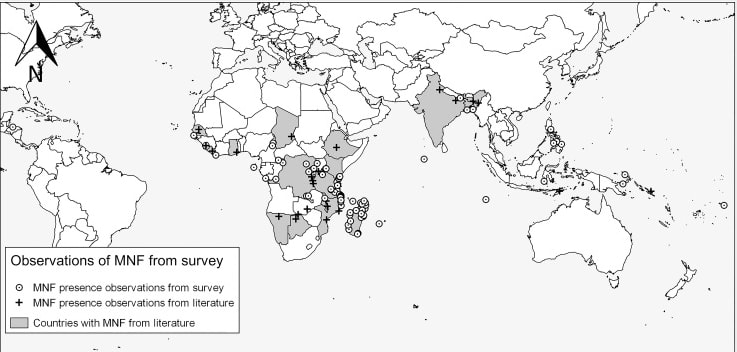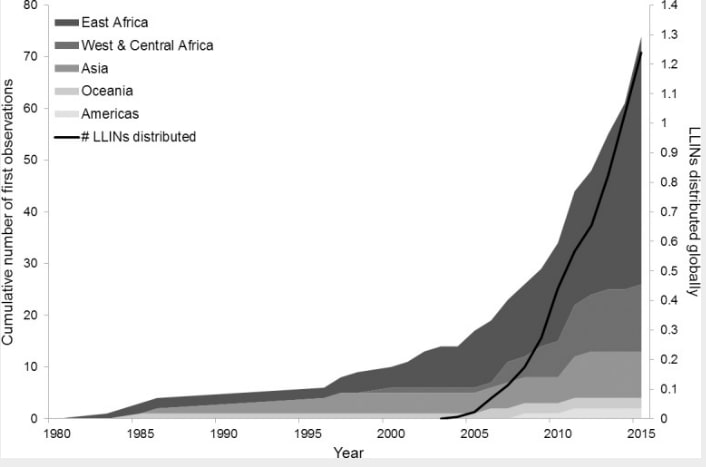There's a common claim that the distribution of antimalarial mosquito nets is bad because they are used for fishing. I usually hear this followed by the quick rebuttal "...but I can't imagine who has a problem with enabling needy people to fish!"
There is of course more merit to the objection. A discussion from 2018 on Future Perfect, which in turn cites Givewell's 2015 evaluation of the topic considering overfishing, environmental harms, and inefficient net distribution, but ultimately finding the problems all insignificant. I want to add some discussion of harms not discussed there.
Last year I was in Kenya conducting an interview on commons management, and it came up that people using mosquito nets for fishing was considered bad behavior especially because mosquito nets are fine enough to trap fish fry and juvenile fish, ruining future harvests. This appears to be a widespread and longstanding concern not directly addressed in either evaluation, partly due to lacking academic research now available. The upshot seems to be that thanks to juvenile catch the impact on fisheries is higher than indicated by those reports.
Here is a journalistic report from 2019, which summarizes this 2019 paper attempting to make a direct link to fishery decline in Mozambique seagrass from juvenile catch via mosquito net fishing. They document high percentage of juvenile catch (56%), with caveats as to time of day and year. They didn't provide a baseline comparison against responsible fishing methods (only other comparably unsustainable ones). Nor is a model of how much juvenile catch is needed to noticeably impact recruitment provided. Here's a subsequent 2023 paper I cannot access claiming significant harm to fisheries from mosquito net juvenile catch in Madagascar's coastal coral reefs (the abstract is confusing, so I am suspicious of its quality).
Belief in observable harms from mosquito net fishing seem to be common in affected communities, as per my interviewee, as well as various comments and tidbits sprinkled throughout academic research and news reporting, and in particular this 2022 survey in Zimbabwe. Poverty is usually given as the reason for doing it anyways. This suggests to me the practice is widespread, substantial enough for many communities to reach the same conclusions about its effects, and likely endemic wherever mosquito nets are distributed and fish resources exist.
It remains unclear to me from these studies or from any larger meta-studies what the numerical prevalence of mosquito net fishing actually is worldwide and how large and how causal an impact they have on global fisheries. (The best global overview so far, from 2018, is neither quantitative nor exhaustive, and was cited in the Future Perfect article.) But overall it is likely that millions of people mosquito net fish, I infer they do so usually in ecologically fragile coastal and riparian settings similar to those in the above studies, and the practice causes probable impacts to future food security.
In summary there's more evidence that mosquito net fishing causes substantial harm than previously discussed in this community (a harm to commons that is balanced against the harm of immediate hunger, of course). I think this is a relatively small update, unlikely to change my mind about the overall positive benefit of free mosquito net distribution. Work to mitigate the harms caused by mosquito net fishing while maintaining widespread mosquito net access to will probably come from non-EA entities. May also be of interest to ecologically minded readers and fish welfarists.



Thanks for this, I'm trying to at least get a couple of numbers to get in the right ballpark to help people calibrate. Epistemic status: uncertain, a couple of hours of research. Takeaway: Probably billions of fish killed.
To get a higher end of the estimate of total fish killed as a result of mosquito net fishing, the appendix of the paper you link to gives an example of a single large-scale fishery in Madagascar where 68.7 million fish were killed in 2018-2019 by 75 families.
Unless I'm misreading, this looks like 80-90% of the total fish numbers were caught through mosquito net trawler (27.7% by weight, but much smaller fish on average, so a higher number).
This other paper in Mozambique provides another example -
theytwo fishers catch around 35kg of (mostly tiny, < 20 mm, so 1-10g?) fish a day, so I guess around 10,000 fish a day? Over 2 million a year (so similar ballpark to Madagascar).These are the locations at which mosquito net fishing had been observed in this study (data mostly from 2015), with a rapidly rising trajectory.
I can't seem to find any better data on the scale of fishing at all of these locations, so I have no idea whether it's closer to 50 or 10000 locations where mosquito nets are used for fishing to a similar extent to those in these articles, but 25 million fish * 50 locations would be 1.25 billion fish.
I think it's safe to assume that at least 1 billion fish, possibly orders of magnitude higher, are killed yearly through mosquito net fishing, most of whom wouldn't be killed if it weren't for the distribution of mosquito nets (due to the small mesh sizes).
Of course, to make a reasonable welfare calculation, you shouldn't just look at the number of animals killed and how painful their deaths must have been. You also have to consider how long these fish would have lived for counterfactually, the quality of their lives and suffering involved in their counterfactual deaths, as well as broader ecosystem effects etc.
But @Dylan Matthews's claim that "There is little research on what fishing with these nets actually does to fish or people — but also little reason to think the magnitudes of these effects are remotely near the number of lives saved by nets" strikes me as indefensible.
Causing billions of fish to experience a painful death is not just a rounding error, and it may well be worth reevaluating whether bednets have had a positive net impact or not.
I couldn't track down comparative data on whose bednets seem to be the most responsible - presumably it's more whoever distributes the most nets in areas close to major fisheries, rather than % of appropriate use.
I also don't know whether the marginal bednet will increase this kind of fishing much (there might already be a glut of bednets).
But these are all important questions that I don't think GiveWell or AMF have ever taken seriously.